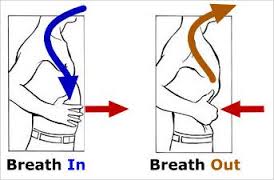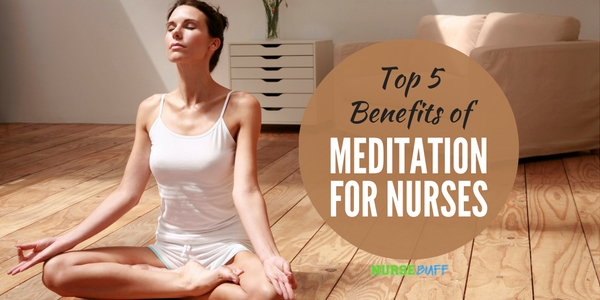For nurses, stress is inevitable. Every day, we face a lot of challenges that affect the way we care for our patients. When not addressed properly, these challenges can affect even our personal lives,too.
To make sure none of these things happen, here are few ideas and benefits of meditation for nurses you should know.
1. Better sleep

If you’ve been taking a lot of night shifts lately, you know how hard it is to get a decent sleep. And that doesn’t happen with night shifts alone. You can also find it difficult to sleep if you’ve had a very busy morning shift, too.
When you don’t get enough sleep, you’ll feel exhausted most of the time. You’ll feel cranky and you’ll find it hard to concentrate. These things can put you at risk of committing medication errors and treating your patients poorly.
Meditating regularly can improve your overall sleeping pattern. Since one of the most common reasons why you can’t sleep well is your overly aroused sympathetic nervous system, you can use various meditation techniques to lower your stress and tension. It works well in addressing both transient and chronic insomnia.
Pro-Tip:
The 4-7-8 breathing technique is one of the most effective techniques you can use to get better sleep. To do this, you simply need to inhale slowly through your nose to a mental count of 4. Hold your breath for another 7 counts. Then, exhale through your mouth for 8 counts while making a whooshing sound. Keep doing these steps for 60 seconds or until you fall asleep.

2. Addresses burnout

It’s not uncommon for nurses to experience burnout at some point in their career. While most nurses blame their working conditions for it, their failure to take a break and meditate are also factors that can contribute to their sudden loss of enthusiasm to work.

If this sounds exactly like you, then taking time off to meditate can surely help you get back on track. Meditation can reduce your overall stress and anxiety with your job. It gives you enough time to reassess the situation and put your goals back into perspective.
Pro-Tip:
Establishing the habit of spending 10 minutes in meditation daily can help rewire your brain. Just switch off any thoughts that linger on your mind and focus on your breathing. You can also practice this technique when you’re overwhelmed with your work. Spend a good 10 minutes on your breathing while concentrating on the task at hand. Improved mental function is one of the best benefits of meditation for nurses.
Read Also: How to Prevent Nurse Burnout and Achieve Work-Life Balance
3. Relieves pain

Nurses face a great deal of pain on a daily basis. They experience neck pain, backache and even leg cramps. In some cases, they can also struggle with shoulder and feet pain.
While most of these discomforts aren’t psychological in nature, meditation can help you deal with them in a different way.
Pro-Tip:
Proper breathing techniques can help you relax and unclench your tired and tensed back muscles. You can do them while sitting, standing or even walking around your floor. One of the easiest ways is controlling your breathing time, such as making sure that your inhales are equal as your exhales.
Read Also: 10 Ways Nurses Can Prevent and Manage Low Back Pain
4. Controls frustrations

Nurses work with different people each day. No matter how courteous and professional your actions are, there will still be patients and even doctors that can rub you the wrong way. They can irritate you and even force you to react the same way to them. When you’re tired from all your tasks and you haven’t had enough rest, it’s hard to remain calm and composed during such situations.

However, instead of responding negatively, it’ll be helpful if you can use meditation to control your anger and frustrations. Meditation boosts the release of serotonin, which is considered as your body’ feel-good hormone. Aside from this benefit, it can also balance out your stress hormones so you can have clear and calm thoughts.
When done daily, meditation can bring you a higher state of awareness to the point that you’ll need lesser and lesser time to adjust to your frustrations.
Pro-Tip:
Insight meditation works well in controlling anger and frustrations. By removing yourself from the cause of your negative emotions, you’ll be able to think clearer and more rational. You can take a 5-minute break and ask another nurse to cover for you while you cool down. Once you are calm enough, you can explain your side and hear what the other person has to say.

5. Helps you deal with death better

When you’re faced with the death of a patient you’ve taken care of for a long time, it’s hard to keep your emotions in check. The same thing can happen when you’re handling patients who died of sudden and tragic causes and you’re the last person to witness their last moments. Aside from that it’s traumatic, the experience can also take an emotional toll on you.
Once this happens, you’ll find it hard to be physically present for the relatives of your patients. You’ll even find difficulty in attending to your other patients’ needs because you are also grieving. As a nurse, it’s important that you don’t lose track of your emotions so that you can perform your job well.
With meditation, you’ll be able to still your mind and rewire your focus. It can help you understand things better so that you’ll be able to cope and learn faster from what had happened. It can also help you adjust easily so you can continue with your work.
Pro-Tip:
You don’t necessarily have to do complicated meditation exercises for this. You don’t even need any complex meditation guides and accessories.

You simply need to spend a short time in a quite place and just concentrate on your deep breathing as you go. It can also help if you can play some music to help you calm down. It’s not necessary to play meditation songs. In fact, you can choose any music you like as long as it can help you focus and meditate. Continue concentrating on your breathing pattern until you’ve restored your self-control.
Read Also: How Do Nurses Deal with Death—10 Advice From Fellow Nurses



















